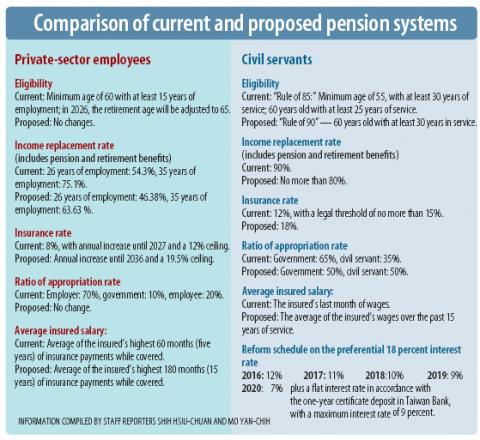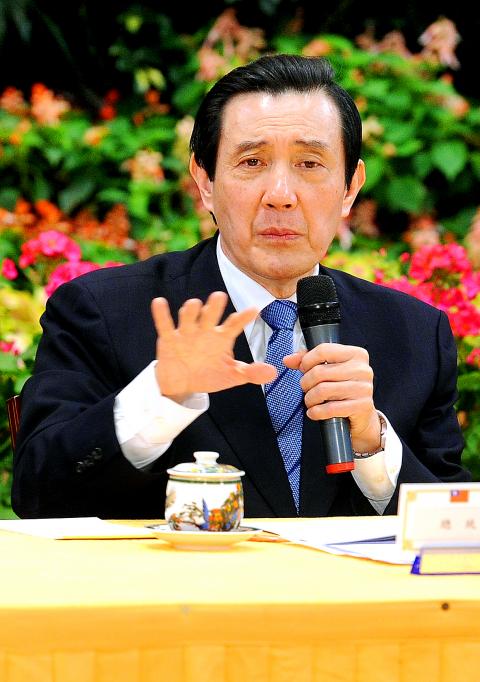President Ma Ying-jeou (馬英九) promised to protect the nation’s pension system from going bankrupt for the next 30 years as he unveiled the government’s pension reform proposals yesterday, insisting that his administration would strengthen its communication with the legislative branch as it prepares to send the draft for approval in April.
Accompanied by Premier Sean Chen (陳冲), Legislative Speaker Wang Jin-pyng (王金平) and Examination Yuan President John Kuan (關中) at a press conference to explain the government’s pension reforms, Ma said that he would give up his right to the 18 percent preferential interest rate on his retirement pension, which would be about NT$23,000 a month.
“The proposal is not perfect, but we’ve tried to make it a thorough one after gathering opinions. The pension system is everyone’s system and we cannot afford letting it collapse. People may receive less money after the reforms, but the revised pension system will assure that we receive our pension without having to worry for at least 30 years,” Ma said at the Presidential Office.

He described the nation’s current pension system first as a time bomb, then as a runaway train that is traveling toward a cliff, and said that it is a priority that the government reform the system immediately, else the Labor Insurance Fund and the retirement funds for the military, civil service and teachers would go bankrupt between 2019 and 2027.
“The pension system time bomb won’t explode during my term ... However, the train will definitely fall off the cliff if we don’t start building a bridge right now,” he said.
The proposed reforms are to be implemented in stages.

Photo: Chu Pei-hsiung, Taipei Times
Kuan said the government would adopt a “rule of 90” system for civil servants in 2016, in which a civil servant can only retire if their age and years in service add up to 90.
For example, a civil servant who has reached the age of 60 and has accumulated 30 years of service would be eligible for retirement. Currently, civil servants can retire if their age and years in service add up to 85.
There would be a 10-year grace period for the new system, while civil servants in special fields, such as police officers and firefighters, would be excluded from the new system, he said.
In the future, the retirement pensions of civil servants should not exceed 80 percent of their final income, he said.
The government also plans to reduce the contentious preferential 18 percent interest rate on savings accounts held by retired civil servants to 9 percent within the next four to five years, he said, adding that civil servants who retired before July 1999 would not be affected by the change.
Kuan said the government would also establish a three-tier pension system for civil servants.
The first tier would be a national pension with a 15 percent contribution from gross salary, the second a mandatory occupational scheme with a 30 percent contribution and the third a non-mandatory commercial pension, also with a 30 percent contribution.
When asked about the growing disputes over the reforms and divisions in society, Ma insisted that the government has tried its best to design a pension system that would narrow the gap between those working in different industries.
He said the government would review the system every five years as it seeks to establish a modernized and systematic pension policy.
Both Ma and Wang dismissed concerns about opposition to the government’s reforms among lawmakers across party lines.
Ma insisted that the government would continue to communicate with lawmakers regarding the reforms, while Wang said that he would facilitate the legislation once it is sent to the legislature for approval in April.

INVESTIGATION: The case is the latest instance of a DPP figure being implicated in an espionage network accused of allegedly leaking information to Chinese intelligence Democratic Progressive Party (DPP) member Ho Jen-chieh (何仁傑) was detained and held incommunicado yesterday on suspicion of spying for China during his tenure as assistant to then-minister of foreign affairs Joseph Wu (吳釗燮). The Taipei District Prosecutors’ Office said Ho was implicated during its investigation into alleged spying activities by former Presidential Office consultant Wu Shang-yu (吳尚雨). Prosecutors said there is reason to believe Ho breached the National Security Act (國家安全法) by leaking classified Ministry of Foreign Affairs information to Chinese intelligence. Following interrogation, prosecutors petitioned the Taipei District Court to detain Ho, citing concerns over potential collusion or tampering of evidence. The

‘FORM OF PROTEST’: The German Institute Taipei said it was ‘shocked’ to see Nazi symbolism used in connection with political aims as it condemned the incident Sung Chien-liang (宋建樑), who led efforts to recall Democratic Progressive Party (DPP) Legislator Lee Kun-cheng (李坤城), was released on bail of NT$80,000 yesterday amid an outcry over a Nazi armband he wore to questioning the night before. Sung arrived at the New Taipei City District Prosecutors’ Office for questioning in a recall petition forgery case on Tuesday night wearing a red armband bearing a swastika, carrying a copy of Adolf Hitler’s Mein Kampf and giving a Nazi salute. Sung left the building at 1:15am without the armband and apparently covering the book with a coat. This is a serious international scandal and Chinese

Seventy percent of middle and elementary schools now conduct English classes entirely in English, the Ministry of Education said, as it encourages schools nationwide to adopt this practice Minister of Education (MOE) Cheng Ying-yao (鄭英耀) is scheduled to present a report on the government’s bilingual education policy to the Legislative Yuan’s Education and Culture Committee today. The report would outline strategies aimed at expanding access to education, reducing regional disparities and improving talent cultivation. Implementation of bilingual education policies has varied across local governments, occasionally drawing public criticism. For example, some schools have required teachers of non-English subjects to pass English proficiency

TRADE: The premier pledged safeguards on ‘Made in Taiwan’ labeling, anti-dumping measures and stricter export controls to strengthen its position in trade talks Products labeled “made in Taiwan” must be genuinely made in Taiwan, Premier Cho Jung-tai (卓榮泰) said yesterday, vowing to enforce strict safeguards against “origin laundering” and initiate anti-dumping investigations to prevent China dumping its products in Taiwan. Cho made the remarks in a discussion session with representatives from industries in Kaohsiung. In response to the US government’s recent announcement of “reciprocal” tariffs on its trading partners, President William Lai (賴清德) and Cho last week began a series of consultations with industry leaders nationwide to gather feedback and address concerns. Taiwanese and US officials held a videoconference on Friday evening to discuss the